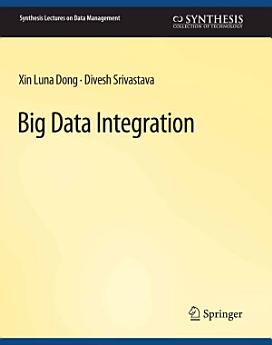Big Data Integration
Xin Luna Dong · Divesh Srivastava
ମଇ 2022 · Springer Nature
ଇବୁକ୍
178
ପୃଷ୍ଠାଗୁଡ଼ିକ
reportରେଟିଂ ଓ ସମୀକ୍ଷାଗୁଡ଼ିକୁ ଯାଞ୍ଚ କରାଯାଇନାହିଁ ଅଧିକ ଜାଣନ୍ତୁ
ଏହି ଇବୁକ୍ ବିଷୟରେ
The big data era is upon us: data are being generated, analyzed, and used at an unprecedented scale, and data-driven decision making is sweeping through all aspects of society. Since the value of data explodes when it can be linked and fused with other data, addressing the big data integration (BDI) challenge is critical to realizing the promise of big data. BDI differs from traditional data integration along the dimensions of volume, velocity, variety, and veracity. First, not only can data sources contain a huge volume of data, but also the number of data sources is now in the millions. Second, because of the rate at which newly collected data are made available, many of the data sources are very dynamic, and the number of data sources is also rapidly exploding. Third, data sources are extremely heterogeneous in their structure and content, exhibiting considerable variety even for substantially similar entities. Fourth, the data sources are of widely differing qualities, with significant differences in the coverage, accuracy and timeliness of data provided. This book explores the progress that has been made by the data integration community on the topics of schema alignment, record linkage and data fusion in addressing these novel challenges faced by big data integration. Each of these topics is covered in a systematic way: first starting with a quick tour of the topic in the context of traditional data integration, followed by a detailed, example-driven exposition of recent innovative techniques that have been proposed to address the BDI challenges of volume, velocity, variety, and veracity. Finally, it presents merging topics and opportunities that are specific to BDI, identifying promising directions for the data integration community.
ଲେଖକଙ୍କ ବିଷୟରେ
Xin Luna Dong is a senior research scientist at Google Inc. Prior to joining Google, she worked for AT&T Labs-Research. She received her Ph.D. from University of Washington, received a Master's Degree from Peking University in China, and a Bachelor's Degree from Nankai University in China. Her research interests include databases, information retrieval, and machine learning, with an emphasis on data integration, data cleaning, knowledge bases, and personal information management. She has published more than 50 papers in top conferences and journals in the field of data integration, and got the Best Demo award (one of top-3) in Sigmod 2005. She is the PC co-chair for WAIM 2015 and has served as an area chair for Sigmod 2015, ICDE 2013, and CIKM 2011. Divesh Srivastava is the head of Database Research at AT&T Labs-Research. He is a fellow of the Association for Computing Machinery (ACM), on the board of trustees of the VLDB Endowment, the managing editor of the Proceedings of theVLDB Endowment (PVLDB), and an associate editor of the ACM Transactions on Database Systems. He received his Ph.D. from the University of Wisconsin, Madison, and his Bachelor of Technology from the Indian Institute of Technology, Bombay, India. His research interests and publications span a variety of topics in data management. He has published over 250 papers in top conferences and journals. He has served as PC Chair or Co-chair of many international conferences including ICDE 2015 (Industrial) and VLDB 2007.
ଏହି ଇବୁକ୍କୁ ମୂଲ୍ୟାଙ୍କନ କରନ୍ତୁ
ଆପଣ କଣ ଭାବୁଛନ୍ତି ତାହା ଆମକୁ ଜଣାନ୍ତୁ।
ପଢ଼ିବା ପାଇଁ ତଥ୍ୟ
ସ୍ମାର୍ଟଫୋନ ଓ ଟାବଲେଟ
Google Play Books ଆପ୍କୁ, Android ଓ iPad/iPhone ପାଇଁ ଇନଷ୍ଟଲ୍ କରନ୍ତୁ। ଏହା ସ୍ଵଚାଳିତ ଭାବେ ଆପଣଙ୍କ ଆକାଉଣ୍ଟରେ ସିଙ୍କ ହୋଇଯିବ ଏବଂ ଆପଣ ଯେଉଁଠି ଥାଆନ୍ତୁ ନା କାହିଁକି ଆନଲାଇନ୍ କିମ୍ବା ଅଫଲାଇନ୍ରେ ପଢ଼ିବା ପାଇଁ ଅନୁମତି ଦେବ।
ଲାପଟପ ଓ କମ୍ପ୍ୟୁଟର
ନିଜର କମ୍ପ୍ୟୁଟର୍ରେ ଥିବା ୱେବ୍ ବ୍ରାଉଜର୍କୁ ବ୍ୟବହାର କରି Google Playରୁ କିଣିଥିବା ଅଡିଓବୁକ୍କୁ ଆପଣ ଶୁଣିପାରିବେ।
ଇ-ରିଡର୍ ଓ ଅନ୍ୟ ଡିଭାଇସ୍ଗୁଡ଼ିକ
Kobo eReaders ପରି e-ink ଡିଭାଇସଗୁଡ଼ିକରେ ପଢ଼ିବା ପାଇଁ, ଆପଣଙ୍କୁ ଏକ ଫାଇଲ ଡାଉନଲୋଡ କରି ଏହାକୁ ଆପଣଙ୍କ ଡିଭାଇସକୁ ଟ୍ରାନ୍ସଫର କରିବାକୁ ହେବ। ସମର୍ଥିତ eReadersକୁ ଫାଇଲଗୁଡ଼ିକ ଟ୍ରାନ୍ସଫର କରିବା ପାଇଁ ସହାୟତା କେନ୍ଦ୍ରରେ ଥିବା ସବିଶେଷ ନିର୍ଦ୍ଦେଶାବଳୀକୁ ଅନୁସରଣ କରନ୍ତୁ।





